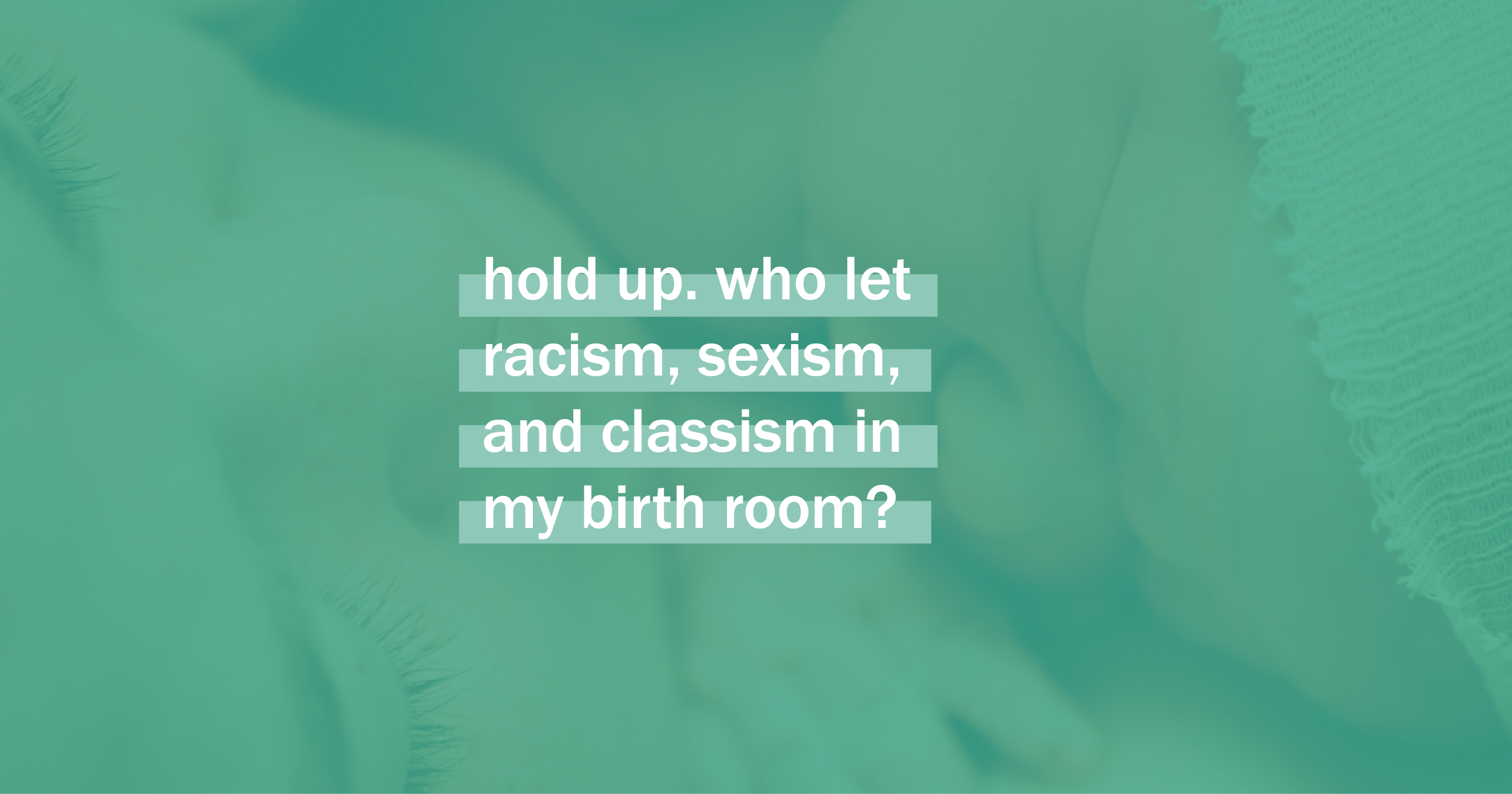Reparations, Redistribution and Other Hopes I Have for My Local Birth Community
Photo by Geovanny Velasquez on Unsplash
The following thoughts come from what I've seen so far, in my two years of engaging in birth work in Richmond, what I've heard my elders share in Richmond and in other communities I've had a chance to visit and hear about, and just what I find myself dreaming. There's room for reparations, redistribution, honoring each other, and supporting folks more fully in this work we're doing. I'd really like to sit at a table that continues having these conversations.
I want to see reparations.
What are reparations? Pretty simply, reparations are amends that are made for wrongs that have been done.
Wrongs have been done and are still being done to folks in the birth world, even here in Richmond. Sometimes these wrongs are traumatic and life-altering, even resulting in death. Other times they are subtle, not even recognized as traumatic at all. But anytime someone is not asked consent before being checked vaginally or having their water broken or being given pitocin, anytime a request to avoid an intervention is denied without medical necessity, anytime someone is not given access to a translator and not communicated with or communicated with with an attitude because their first language isn't English (translation is supposed to be provided by law in hospitals), anytime a racially insensitive or outright offensive comment is made, whether the speaker recognizes it or not — these are wrongs that are not uncommon in our community.*
These wrongs are the reason I'm a birth worker. Sometimes they're prevented by my presence, and other times the edge is simply taken off as I step in to protect space for my clients to think clearly about the decisions they want to make, and offer comfort that otherwise might not be there at all.
I empathize with the reality that care providers face of rising insurance costs of their own and the real potential career destruction that comes with liability, but this current climate in which they often reign with seemingly unchecked power, and with every defense up against ever admitting any wrongdoing — imposing and protecting themselves at the potential expense of their patients — it’s unhealthy on every side. As professionals, doctors need safe spaces to recognize where they’ve fallen short and grow. The whole system needs a space to do that. Where are the policies falling short? Where are they setting folks up for poor experiences?
Meanwhile, as patients, parents need to have their experiences affirmed and recognized, to be apologized to when they’re wronged, and moving forward the parents served after them deserve care that gets better — not just remains cloaked in ignorance, repeating errors of the past.
What could this practically look like? At the very least, our hospital systems investing in practices and policies that support better comprehensive and individualized care for all expecting parents.
Take a moment and consider this. Imagine you go to the doctor. You're sitting on the examining table. The nurse left a while ago, the doctor's coming in soon. The doctor comes in, sits on the edge of the table and sticks his gloved finger up your nose. How does this situation strike you? Uncomfortable? Inappropriate? Jarring?
I've seen a doctor come into a room with a sleeping laboring person and proceed to begin a vaginal check without prompting. I've seen a doctor clamp an umbilical cord, after the mother said she wanted delayed cord clamping, laughing and saying, "This isn't my first birth," then cutting the infant's cord, yes, against parental wishes.
I understand that hospitals are not full of malicious people cackling in closed door meetings. But something has been lost in this setting. Some recognition of how these roles of patient and care provider should really be regarded. And someone within those walls needs to recognize and begin repairing.
I also wonder who’s at the table for these conversations about making healthcare better? Folks like the families my colleagues and I work with? Many of whom would be owed reparations should that explicitly exist? I find that doubtful, unfortunately.
Maybe that'd be a place to start. With listening to the people being served.
I want to see redistribution.
What makes redistribution different than reparations? In my mind, redistribution isn’t necessarily connecting the ones who’ve explicitly done the wrongdoing to the ones who’ve been wronged, but more broadly ones with privilege or access to ones with less privilege or access.
This concept is particularly significant in the birth world, from my perspective, because not all birth workers enter into this work with the dream/vision/intention of creating a typical for-profit business model. Some of us enter into this work as a sort of mission, to work with folks who look like us, have experiences like we’ve had, and we know we are uniquely equipped to serve.
The doula who enters into work the former way and the doula who enters into this work the latter way often seem at odds — not just in the Richmond community but others. But we can work together. I’m not going to attempt to sugar coat it. I don’t think it’d be easy. But I think it’s a conversation we need to really keep having.
I have a very specific vision for this. It’s actually kind of simple and extremely doable.
There are a lot of doulas in Richmond who offer their services from $0-$1000+ whether as individuals or as a part of businesses and collectives. For the sake of this hypothetical situation let’s just say there are 5 birth doulas who take on an average of 2 clients a month for a year for $1000. They build into their business a plan to donate $50 per client to anorganization that provides free doula support. They also ask their clients at their postpartum follow-up session if they’d be willing to make a donation to someone in Richmond having a doula who can’t afford it.
What would happen?
5 doulas, 2 births a month, 12 months
= 120 births
$50 from each $1000 fee
= $6000
25% of families (30) give $100 in addition
= $3000
That’s $9000 from 5 birth doulas and the families they worked with. We have more than 5 birth doulas in Richmond, and possibly more than 25% of families who'd be willing to give toward the gift of doula support for others. We also have postpartum doulas. And birth educators. And photographers. And placenta encapsulation specialists. (We have abortion doulas as well, but I've left that out of this list because personally I don't think someone should have to pay for this support, the depth of the struggle to just safely access the service when it's sought out is deep enough.)
The economy of our birth and reproductive community has the capacity to sustain work that reaches further. We just haven’t gotten on the same page about it… yet.
I want birth workers to know each other and honor each other’s expertise and callings.
I understand that not everyone feels like they have the capacity to — or feels like they should have to — stretch themselves to meet folks from very different parts of this community. And I’m not saying we should all have to go to the same monthly potluck or cookout. But we should all know that the others exist and honor and respect the spaces that we occupy.
What does honoring each other’s expertise and callings look like?
It's about context and thought. It can mean challenging your friend and fellow birth worker to teach that class, to add that package, to share those skills they have. It can mean suggesting that someone else sit down or slow down, not try to be a jack of all trades, or center themselves in an area, because perhaps it's inappropriate, or it's undermining another part of the community. It can mean going to someone who’s been doing some kind of work for a long time and saying, “I have an interest in this too, do you think our community has need for more of it? Or that I can reach another segment?” And then being open to hearing, "No," and their reasoning. They might be right. They might not be. But it'd be better to make your decision with their perspective.
The point is, honoring each other requires that we step outside of ourselves and our own interests a little to really recognize and value others. What if we overcommunicated? I wish we would overcommunicate just a little more. Would other problems come out of that? Probably. It’d be refreshing though to deal with those problems for a change. I’d be intrigued by the challenge.
I want our families to be supported in body, mind, and spirit from conception (or prevention thereof) to birthing outcome.
Does this strike you as too good to be true? As I write it, I can’t deny there’s a part of me that wonders how I could even dream it. But I don’t just dream it, I’m working with folks toward it.
Because people are going through all of these things. Whether we do nothing or we do something. People around us are struggling with infertility, they’re struggling with miscarriage, they're struggling with preventing pregnancy, they’re struggling with unexpected pregnancies, with their decisions on abortion, with healthily carrying their babies, and with having the births they want and they can safely have — where, with whom, in the way that fits them and their family.
Any of us who are working within this birth community — I believe we’re all on the same page with that last paragraph. We all care very deeply about these people and want the best for them, and are already willing to work for it. Let’s work deeper, wider, and wiser.
*Though I feel like it shouldn't be necessary to add, I want to say that I've seen hospital providers, from nurses to OBs to midwives, show the best of hospital care also. The system we're struggling in often does these folks a disservice as well. I believe if they felt better supported, we'd all reap the benefits of that, too.
Have something you'd like to talk with me more about? Hit me up.











DYK 60-75% of body/breastfeeding parents bedshare — EVEN when they don’t plan to? Let’s talk about safe sleep!